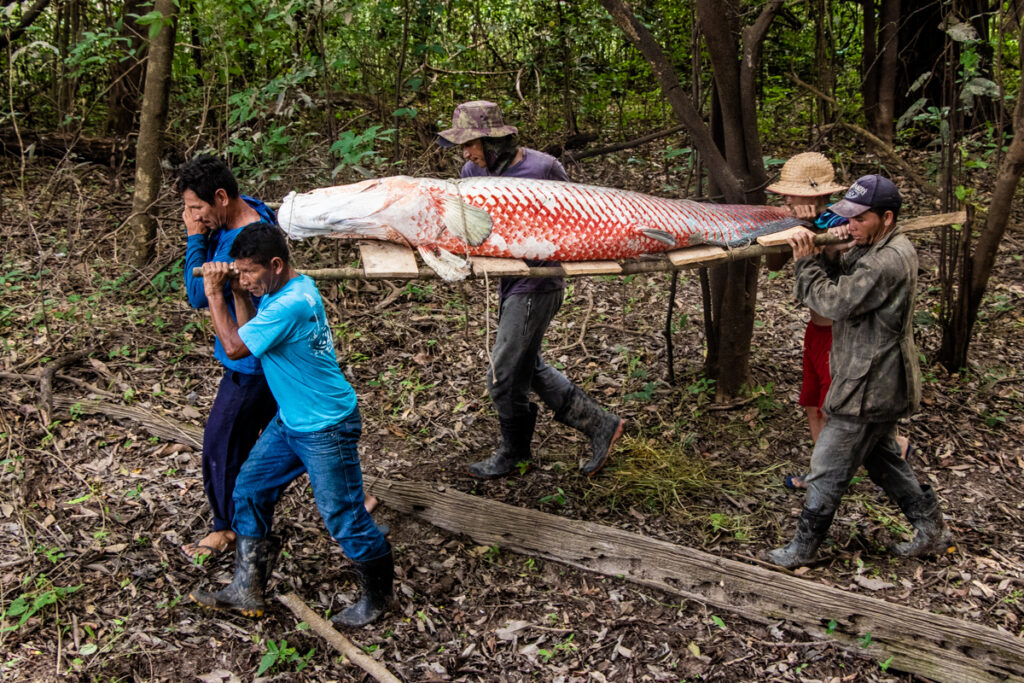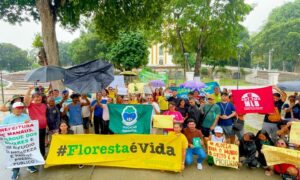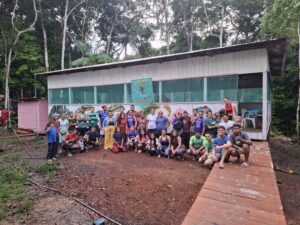The severe drought affecting the Amazon has led to an extension of the fishing deadline in communities; nevertheless, some have managed to maintain the schedule
By Maria Cunha
Translated by Laiane Lessa
The arapaima management in the Mid-Juruá is a conservation and sustainable practice that aims to guarantee the preservation and responsible use of this iconic freshwater fish species from the Amazon. Through techniques such as fishing control, monitoring stocks, and the adoption of protecting measures, the goal is to reconcile the economic development of families with the preservation of aquatic environment and maintenance of the traditional communities that rely on this natural resource. This sustainable approach promotes biodiversity conservation and contributes to the socio-economic development of the region. The arapaima management is carried out through implementation of regulatory measures and sustainable fishing strategies, and one of the main approaches is the definition of fishing seasons establishing specific periods to allow arapaima fishing. This ensures that the species has sufficient time to reproduce and maintain a healthy population.

The local communities play a fundamental role in this process. They actively participate in decisions related to arapaima management, contributing with their traditional knowledge and practical experiences. This participatory approach strengthens the communities connections with the environment and promotes the conservation of the species.
Nowadays, management has become one of the most profitable productive chains in the region according to the results obtained by the families. The routine established by residents, ranging from environmental protection to community organization, brings a very important sustainability and social development bias, transforming the arapaima chain into a reference for a sustainable economy within and outside the territory.
This year, the drought in the Amazon has been growing concern. The region, known for its lush tropical forest and characteristic humidity, is facing a serious shortage of rain, resulting in an extended period of drought. This drought is a natural phenomenon that occurs periodically, but the impact this year has been more intense. In addition to affecting the quality of life of the riverside population in various ways, the performance of the arapaima production chain has also been affected. The decreasing level of lakes and rivers, along with the difficulty of accessing fishing environments are some one of the natural factors that have hindered the follow through of the management fishing schedule in the region.
Several communities couldn’t meet their entire fishing quota, and others had to necessarily postpone fishing dates. Considering the emergent situation, the organizations that compromise the Arapaima Collective and are active in the management of the species in the Amazon State have requested an extension of the arapaima fishing deadline to the Brazilian Institute of Environment and Renewable Natural Sources (IBAMA) up to december 20, 2023, so that the communities can accomplish this extremely important activity for everyone.
Despite the drought, some communities have still managed to establish their routine in the context of arapaima management productive chain. São Raimundo community, located in the Mid-Juruá Extractive reserve, and Toari, located in the Uacari Sustainable Development Reserve, were examples of communities that were able to meet their quotas. Despite some logistical difficulties due to the entrance of the stream that provides access to the São Raimundo community, it was possible to conclude the harvesting of 418 arapaimas, ensuring the projected income from this activity to the community in 2023.
“This year was a greater challenge for us; this drought in the Amazon has led us to reflect on how attentive we have to be to climate changes, as it may affect our entire production, including those that we prioritize for our quality of life, such as the arapaima chain. That’s why we have big dreams to add more value to the managed arapaima in our region, such as certifying fair commerce, for example”, says Manoel Figueiredo, a management and leader of the São Raimundo community, from the Extractivist Reserve of the Mid-Juruá.
It is essential to create communitarian strategies and policies in governamental instances so that arapaima management can withstand these extreme events. After all, the sustainable management of arapaima in the Mid-Juruá Territory has shown excellent results. The arapaima population has been gradually recovering, and the stocks are healthier. Moreover, the adoption of these measures has brought socio-economics benefits to the local communities, providing a source of sustainable income and preserving the culture of traditional fishing.






